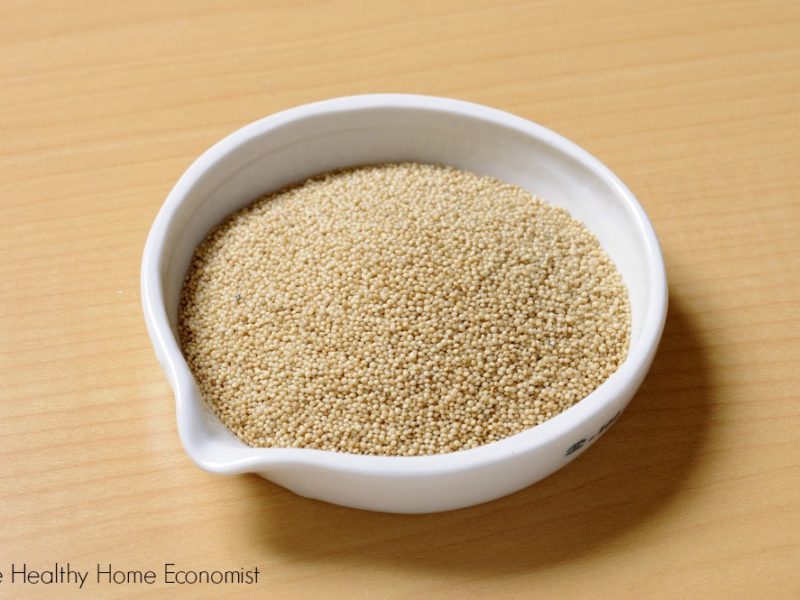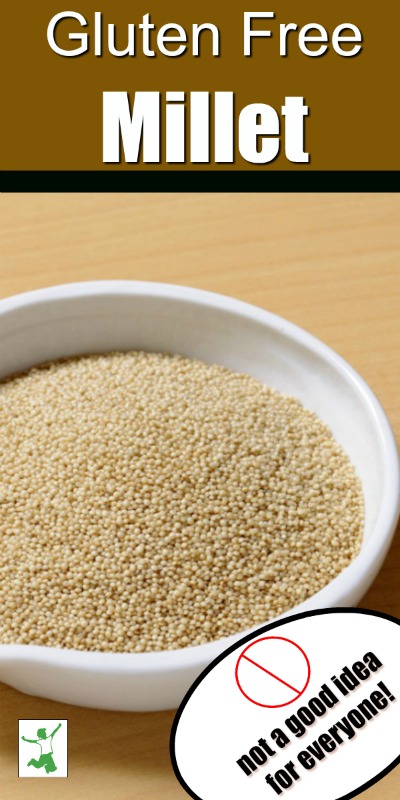Examination of why millet should optimally be eaten in moderation as a gluten-free whole grain in order to avoid disrupting hormone health.

Gluten allergies are clearly on the increase in our modern society. It seems like practically every other person I know these days has some sort of digestive issue that avoiding gluten would probably improve.
At the top of the list of gluten-containing foods is wheat. It is the indisputable, primary staple of the Western diet. Wheat is also the very foundation of the controversial USDA Food Pyramid.
Given how important bread and other wheat-based carbohydrates are to our society’s basic food requirements, it’s no wonder that folks seek a quick and easy substitute for wheat bread and wheat-based snacks when a gluten allergy or Celiac disease has been diagnosed.
Millet: Ancient Gluten-free Whole Grain
Enter millet. This ancient grain was cultivated in East Asia as far back as 10,000 years ago, according to archaeologists. Surprisingly, the cultivation of millet in prehistoric times was more prevalent than even rice, particularly in what is now China and the Korean peninsula.
Millet’s resistance to drought is perhaps the reason for its popularity in ancient times and its spread to Europe by 5000 B.C.
Despite the 5000 years cultivating this whole grain as a staple food, millet porridge is considered a traditional food in Russia as well as China. Use of millet is also widespread in Africa, like gluten-free teff, likely due to the drought-prone climate.
Millet Bread: Logical Substitute for Wheat
The protein structure of millet is quite similar to wheat. The one glaring exception is that millet is a gluten-free grain. Wheat contains copious amounts of this hard to digest plant protein.
When plain millet flour is used for baking bread (as opposed to homemade gluten-free flour or a healthy gluten-free flour mix from the store), the resulting loaf is light, white, and quite similar in texture to wheat bread. As a result, people who wish to avoid gluten tend to immediately gravitate to millet bread as the most logical and palatable substitute.
Millet bread is extremely popular in health food stores. Sami’s Bakery and Deland Bakery are two local bakeries that sell an absolute ton of millet bread to these stores around my local metro area.
I recently corresponded with a person up the East Coast of the USA who was consuming a lot of the millet/flax chips as an alternative to wheat-based snacks and had no idea of the potential health risks from consuming so much millet.
It was this discussion that led me to write this blog and warn folks about the dangers of consuming too much millet!
Potent Goitrogens
While millet does not contain gluten, it does contain goitrogens. These are substances that suppress thyroid activity and can lead to goiter. This condition involves enlargement of this very important gland which resides in the throat. Low iodine intake can also lead to goiter for those who rely on millet as a staple according to the Journal of Endocrinology and Metabolism.
Hypothyroidism is a serious and sometimes debilitating condition. It accompanies a weak or enlarged thyroid such as what occurs with goiter. Depression, difficulty losing weight, loss of hair, cold hands/feet, and fatigue are common hypothyroid symptoms. By some estimates, hypothyroidism is at epidemic proportions in Western society. (1)
Goitrogens in foods that contain them are usually reduced by cooking such as cruciferous vegetables like broccoli. However, cooking actually increases the goitrogenic effect of millet! Incidentally, the same effect occurs when fermenting soy.
Therefore, when folks begin eating large amounts of millet bread with a wholesale switch over from wheat, the thyroid suppressing effects of this simple dietary change can be profound. Injuring the thyroid can have a cascade effect on other glands as well. For example, those suffering from adrenal fatigue many times have thyroid issues as well.
Moderation is Critical
Protect your thyroid at all costs! It is a real challenge to unwind the effects of hypothyroidism once this vital gland is weakened or enlarged. Don’t take any chances with your thyroid health by consuming large amounts of millet bread or millet based snacks.
If gluten and/or wheat is a problem, then simply reduce bread consumption. Alternatively, use another grain that is both gluten-free and non-goitrogenic such as rice, oats or teff. Be sure to get quality, though, as rice is frequently high in arsenic.
Alternatively, try using grain-like gluten-free foods such as highly nutritious buckwheat, amaranth, or the starchy tuber cassava. They are excellent for baking too!
Millet bread consumption is fine in moderation if your thyroid is healthy – just don’t overdo it!
Given how difficult it is in modern society to maintain thyroid and overall glandular health, taking a chance by eating a lot of millet bread is a risky proposition indeed.
Traditional peoples did not have the constant stresses and strains on their glands like modern people do.
For example, they did not have to contend with pollution of their food, water, air and overall environment.
Therefore, we must be overprotective of our thyroid health. This includes avoiding regular consumption of foods that might impair it in any way.

Millet Alternatives That Preserve Thyroid Function
If you have thyroid issues and need alternatives to millet, here is a list of the healthiest options to consider.
- Einkorn Benefits (contains “good gluten“)
- Teff Benefits
- Yuca Root Benefits
- Arrowroot Benefits
- Wild Rice Benefits
- Farro (great if only modern wheat is the problem)








Hello Jo,
Look up Vegalicious Elena. She overcame hypothyroidism with her diet. Good luck!
I have a severe millet allergy – I get extreme food poisoning symptoms when eating even a small amount. Just heads up before you munch on it 😉
Millet is a goitrogen. Rice is full of arcenic (cancerogen) and oats are very high in phytic acid and will rot your teeth if you eat it. What is there left to eat? What bread to feed your children? Honestly this constant stress of figuring out what to eat is worst for your health than enjoying your life and not worrying about what to eat.
we should eat millet because of
thepdi.com/hunza_health_secrets.htm
Hi sripriya ….except pearl millet you can go ahead for other millet☺️
Hi. I am 65 years old Asian female . I suffer from HYPOTHYROID , high BP and osteo arthiritis. My last annual blood test showed high potassium as well as Uric acid. I am totally confused about my diet. My height is five feet and one inch and my weight is 84 kilos. Since I am a vegetarian I dont know what to take for a healthy diet , since I am told that neither soy , nor pulses nor dairy nor millet is good for me.
Please help
Jo
Sorry but this is literally the first ever article or anything published giving negative information regarding millet. I agree with previous comments, ANYTHING eaten or drank in excess is never good. However I honestly questioning the validity of any of this so-called data.
I have diabetes and hypothyroid, what should be my diet plan. If I have millets its not good for thyroid and its good for diabetes. I am totally confused.please help. Imy age is 34
If your problem is hypothyroidism, then don’t eat millet at all. If you have diabetes, it is better to lower or avoid simple carbohydrate all together. You can always eat lots of veggies, legumes, mushroom, meat and poultry and some low GI fruits plus exercise. That’s going to help you with your diabetes. Hope this helps
How much is moderate? for millet consumption… Is 2 slices a day over doing it?
Not only does the following blog post go in the same direction as The Health Economist, but sources are cited as well:
thepaleodiet.com/millet-gluten-free-grain-avoid/